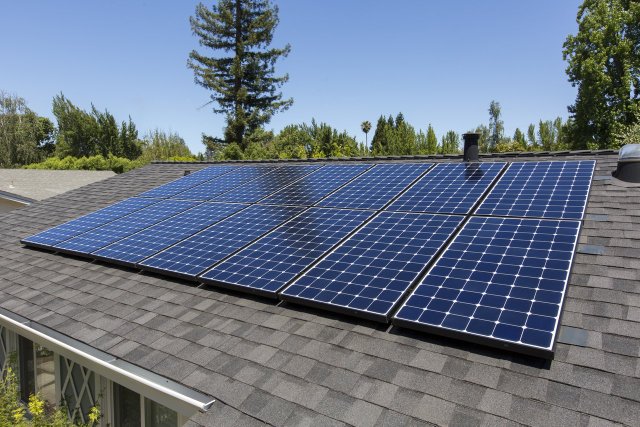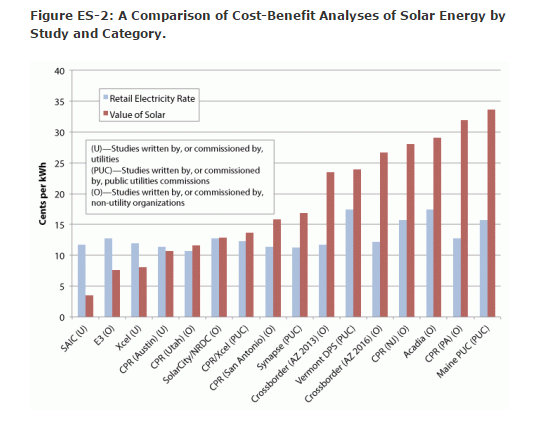Net metering is often seen as a good deal for solar installers and their customers, but a negative for utilities and their customers — the non-solar taxpayers in the community. It is said that those others are subsidizing all the great benefits the solar adopters receive. Is it true? A report released by Environment America Research & Policy Center says no, and also the opposite — that solar panels on homes, schools and businesses often provide more benefits than they receive through programs like net metering.
Well now.
“Solar power’s rewards are far greater than its costs,” said Bret Fanshaw, Environment America’s solar program coordinator and report co-author. “We should be encouraging even more solar, not penalizing it.”
“Our analysis shows that the people and businesses who invest in rooftop solar aren’t just guiding us away from the cliff, they’re also providing benefits to society and to their fellow ratepayers,” says Gideon Weissman of Frontier Group, report coauthor.
What is this report?
The Environment America Research & Policy Center report, Shining Rewards: The Value of Rooftop Solar Power for Consumers and Society (2016 edition) comes as policymakers around the country consider proposals from utilities to undermine successful solar energy programs, including net metering.
The authors’ review of 16 recent analyses shows that individuals and businesses that decide to go solar generally deliver greater benefits to the grid and society than they receive through net metering. The conclusion reached is that decision-makers should recognize the great value delivered by distributed solar energy by preserving and expanding access to net metering and other programs that ensure fair compensation to Americans who install solar energy.
Inside the findings
Solar energy on rooftops can help communities to avoid greenhouse gas emissions, reduce air pollution harmful to public health and create local jobs, the report shows. Net metering programs credit solar panel owners when they generate more power than they use, providing electricity for other customers. Utilities then credit solar panel owners a fixed rate – often the retail price of electricity – for providing excess power to the grid, similar to rollover minutes on a cell phone plan.
The arrangements have helped solar energy skyrocket, but in recent years utilities have increasingly attacked them as unjustified “subsidies,” including in Nevada, where utility NV Energy urged regulators to end the state’s retail rate net metering program.
This report tells a different story. An examination of studies from around the country shows that the dollar and cents value of solar is often higher than the credit utilities provide to customers.
Of the 16 studies reviewed, 12 found that the value of solar energy was higher than the average local residential retail electricity rate. The median value of solar power across all 16 studies was around 16 cents per unit, compared to the nation’s average retail electricity rate of about 13 cents per unit. All 16 studies found that solar panel users offered the electric system net benefits.
In other words: utilities were likely underpaying solar panel owners, not subsidizing them.
RELATED: Solar vs. the state: Net metering, rate battles are heating up around the country
Benefits of solar energy to the grid
Avoided energy costs. Solar energy systems produce clean, renewable electricity on-site, reducing the amount of electricity utilities must generate or purchase from fossil fuel-fired power plants. In addition, solar photovoltaic (PV) systems reduce the amount of energy lost in generation, long-distance transmission and distribution, which cost U.S. ratepayers about $21 billion in 2014.
Avoided capital and capacity investment. By reducing overall demand for electricity during high-load daytime hours that form the peak period for most utilities, solar energy production helps ratepayers and utilities avoid the cost of investing in new power plants, transmission lines, distribution capacity, and other forms of electricity infrastructure.
Reduced financial risks and electricity prices. Because the price of solar energy tends to be stable over time, while the price of fossil fuels can fluctuate sharply, integrating more solar energy into the grid reduces consumers’ exposure to volatile fossil fuel prices. Also, by reducing demand for energy from the grid, solar PV systems reduce its price, saving money for all ratepayers.
Increased grid resiliency. Increasing distributed solar PV decentralizes the grid, potentially safeguarding people in one region from other areas that are experiencing problems. Emerging technologies, including smart meters and small-scale battery storage systems, will enhance this value.
Avoided environmental compliance costs. Increasing solar energy capacity helps utilities avoid the costs of installing new technologies to clean up fossil fuel-fired power plants or meeting renewable energy requirements, and avoid the cost of emission allowances where pollution is capped.
Here’s that link again to view the full report for yourself.
— Solar Builder magazine


Leave a Reply
You must be logged in to post a comment.